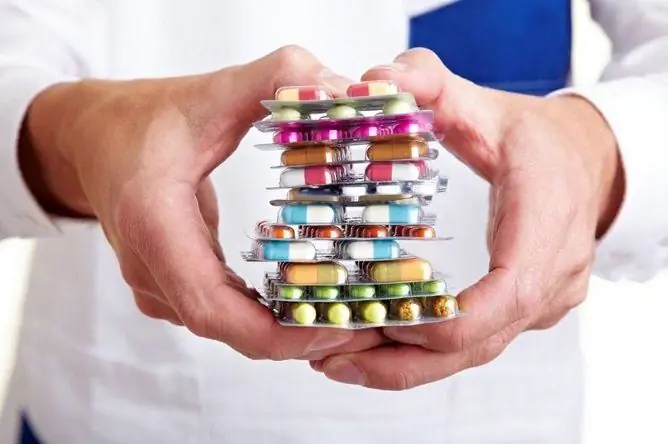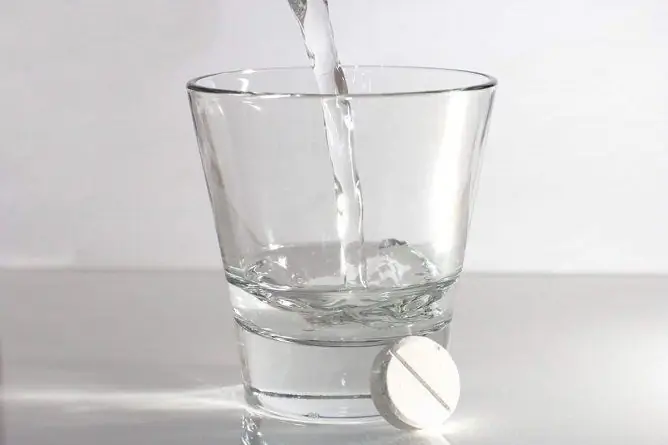How to quickly reduce blood pressure with pills: drugs for high blood pressure
The content of the article:
- General principles of treating hypertension with pills
- How to lower blood pressure: fast-acting tablets
-
The main groups of drugs that reduce blood pressure
- Beta blockers
- Angiotensin-converting enzyme inhibitors
- Calcium antagonists
- Diuretic drugs
- Sartans
- Other drugs
- Video
Modern advances in pharmacology make it possible to quickly reduce pressure with pills and reliably control the course of arterial hypertension (hypertension, hypertension). At the initial stage of the disease, only one antihypertensive drug is usually prescribed, and combination therapy is used only in advanced cases.

Any pressure pills should be prescribed exclusively by the attending physician
General principles of treating hypertension with pills
In order for the therapy of hypertension to be as effective as possible and not be accompanied by the development of complications, it is necessary that it be prescribed by a doctor. It is unacceptable to rely on the reviews of friends, since the same drug can quickly relieve high blood pressure in one person, but be absolutely ineffective in another.
There is a general set of principles for antihypertensive therapy:
- Tableted drugs are used mainly for routine treatment, maintaining blood pressure (BP) at a normal level and preventing the development of hypertensive crises. If an urgent lowering of blood pressure is required, then injectable forms of antihypertensive drugs are preferred.
- Medicines that lower blood pressure are prescribed to the patient in a minimal dose. Subsequently, every 24-48 hours, under pressure control, the dose is increased to an effective dose.
- It is strictly forbidden to independently increase the dose of antihypertensive drugs prescribed by the doctor, as this can sharply reduce blood pressure up to the development of a collapse.
- They seek to treat hypertension with one drug. Combination therapy is used only if there are clear indications.
- Optimal treatment with prolonged-release drugs, which gently reduce high blood pressure and do not allow it to rise for a long time (12-24 hours).
- Drug treatment of hypertension should be carried out regularly for a long time, often throughout life. Patients should be informed about the inadmissibility of skipping medication, as this can lead to a significant increase in pressure, up to the development of a hypertensive crisis.
How to lower blood pressure: fast-acting tablets
Antihypertensive drugs are represented by several pharmacological groups, each of which has its own mechanism of action. Depending on the specific clinical situation, the doctor may prescribe a drug that acts immediately (literally 15-20 minutes after administration) or has a milder, but prolonged effect.
If you need to quickly reduce blood pressure, the drugs of choice can be:
- Capoten (Captopril, Blocordil, Aceten). It is successfully used in the treatment of hypertension of various origins, including primary. It begins to have a hypotensive effect within 15-20 minutes after ingestion, which reaches a maximum after 60 minutes and lasts for 10-12 hours. It can be used in people with heart failure.
- Zokardis (Zofenopril). The drug belongs to the group of angiotensin-converting enzyme (ACE) inhibitors. A decrease in pressure is noted within an hour from the moment of taking the drug, and the effect lasts up to 24 hours. The drug has a number of contraindications (pregnancy, age under 18, hyperkalemia, liver failure), so it can only be taken as directed by a doctor.
- Enalapril (Enam, Enap, Renitek, Berlipril). This drug is most effective in patients with renovascular hypertension, when drugs from other groups are ineffective. Cannot be administered to pregnant and lactating women, children under 18 years of age.
- Diroton (Lisinopril). Lowers blood pressure quickly. Well suited for the correction of arterial hypertension in diabetes mellitus. Nevertheless, this drug should not be taken without a doctor's prescription, as it can cause a sharp decrease in blood pressure, cause orthostatic collapse.
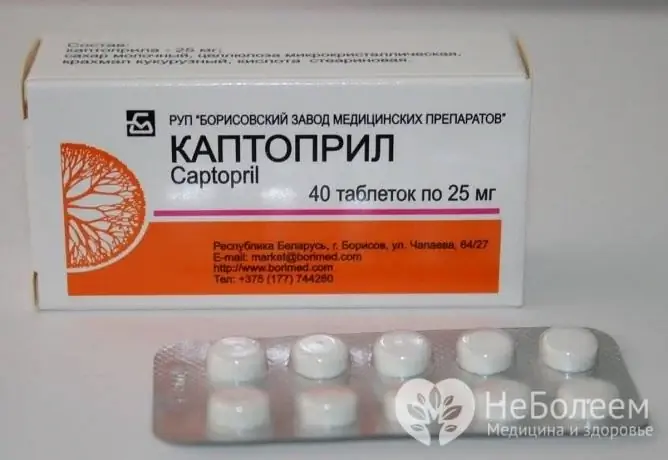
Captopril - a drug to quickly lower blood pressure
The main groups of drugs that reduce blood pressure
There are various reasons for an increase in blood pressure. Therefore, for the treatment of hypertension, it is necessary to use drugs with a different mechanism of action and belonging to different pharmacological groups.
Beta blockers
One of the most widely represented groups of antihypertensive drugs. This includes Anaprilin, Bisoprolol, Cordinorm, Nebikor, Atenolol.
The mechanism of action of beta-blockers is to block beta-adrenergic receptors and prevent the effects of catecholamines (norepinephrine, adrenaline) on them. Provide the following effects:
- lower blood pressure;
- decrease strength and heart rate;
- reduce myocardial oxygen demand;
- lengthen diastole (period of relaxation of the heart);
- improve coronary perfusion (myocardial blood supply);
- increase exercise tolerance;
- have antiarrhythmic action.
Beta blockers are most often prescribed to patients for the treatment of hypertension complicated by left ventricular hypertrophy. They can be used in the treatment of young patients with an active lifestyle. Also, an indication for the appointment of beta-blockers is a combination of arterial hypertension with arrhythmia or angina pectoris, a condition after myocardial infarction.
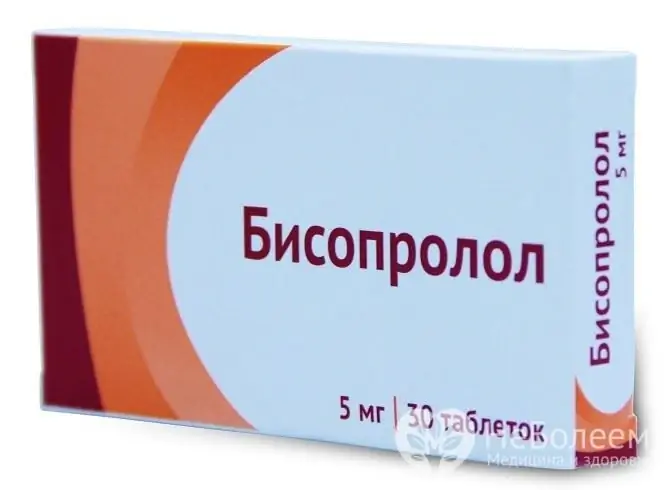
Bisoprolol - a drug of the beta-blocker group
Beta-blocker therapy may be accompanied by the following side effects:
- bradycardia;
- spasm of peripheral vessels;
- decreased renal blood flow;
- bronchospasm;
- headache;
- sleep disorders;
- muscle weakness;
- depression.
Abrupt cessation of long-term therapy with beta-blockers is not allowed, since this can provoke a withdrawal syndrome, which is characterized by a sharp increase in blood pressure, the onset of an arrhythmia attack, and an increased risk of myocardial infarction.
Contraindications to beta-blockers are:
- cardiogenic shock;
- pulmonary edema;
- bronchial asthma;
- severe heart failure;
- atrioventricular block II-III degree;
- bradycardia less than 50 beats per minute;
- hypotension (systolic pressure less than 100 mm Hg);
- insulin-dependent decompensated diabetes mellitus.
Angiotensin-converting enzyme inhibitors
The hypotensive effect of angiotensin-converting enzyme (ACE) inhibitors is due to the effect on the renin-angiotensin system. In addition, they slow down the breakdown of bradykinin, a biologically active substance with a pronounced vasodilating (vasodilating) effect. This group includes Captopril, Enalapril, Zofenopril.
ACE inhibitors reduce proteinuria, which is the loss of protein in the urine. Therefore, they are considered as drugs of choice for the treatment of hypertension, combined with chronic kidney disease, diabetes. The results of clinical studies have shown that against the background of therapy of arterial hypertension with ACE inhibitors in patients, the risk of developing heart failure and myocardial infarction is significantly reduced.
The drugs of this group of antihypertensive drugs are usually well tolerated and much less likely to cause the development of negative metabolic effects than diuretics and beta-blockers.
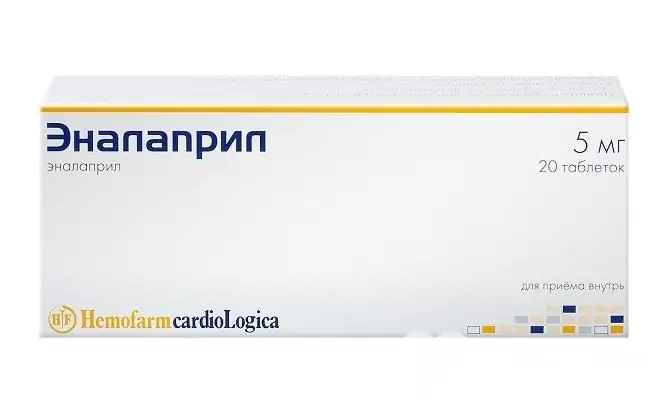
Enalapril is an antihypertensive drug of the ACE inhibitor group
Side effects of ACE inhibitor therapy can include:
- the development of acute renal failure in patients with bilateral renal artery stenosis;
- dry cough;
- significant decrease in blood pressure;
- angioneurotic edema;
- Stevens-Johnson syndrome;
- neutropenia;
- impaired liver function;
- decreased sex drive.
According to Canadian researchers, long-term therapy of hypertension with ACE inhibitors increases the risk of falls and fractures in patients by 35%. This effect is associated both with the presence of an orthostatic effect (a decrease in pressure at the time of the transition of the body from a horizontal to a vertical position), and with a change in the morphological structure of bone tissue.
Calcium antagonists
Speaking about which pills reduce blood pressure, you should definitely talk about calcium antagonists (slow calcium channel blockers, L-type calcium channel blockers). This is an extensive and diverse group of drugs that have the same mechanism of action, but differ from each other in tissue selectivity, pharmacological kinetics, and the effect on the heart rate. Calcium antagonists include Amlodipine, Nifidepine, Verapamil.
The main mechanism of action of blockers of slow calcium channels is that they prevent the penetration of blood vessels and myocardium into muscle cells of calcium ions from the extracellular space. As a result, the arteries and arterioles expand, which is accompanied by a decrease in blood pressure.
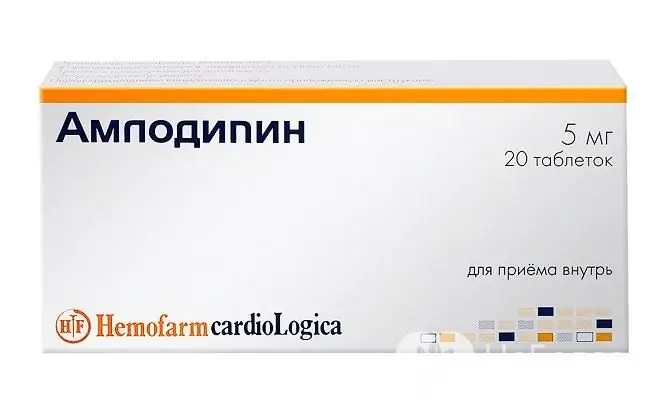
Amlodipine is a calcium antagonist
In case of a hypertensive crisis, when it is necessary to quickly reduce the pressure, the drug Pharmadipin can be used as directed by a doctor. It is a nifedipine solution and is intended for oral administration. It should be taken as follows: drops are applied to a small piece of sugar (in the amount prescribed by the doctor, but not more than 5-7 drops) and then dissolve it under the tongue. The effect of the drug begins to manifest itself as early as 5-7 minutes after taking it. The antihypertensive effect reaches a maximum in 30-40 minutes and lasts for 3-4 hours. Pharmadipine is intended solely for the provision of emergency patients and should not be drunk for the routine treatment of hypertension.
The spectrum of side effects of calcium antagonists includes the following conditions:
- dizziness and headache;
- peripheral edema;
- palpitations;
- dyspepsia (nausea, vomiting, constipation, flatulence);
- disorders of carbohydrate metabolism.
Calcium antagonists should be taken strictly as directed by your doctor. Contraindications to them are:
- severe heart failure;
- sick sinus syndrome;
- critical aortic stenosis;
- WPW syndrome with attacks of atrial flutter or atrial fibrillation;
- pregnancy and lactation.
Diuretic drugs
Diuretics (diuretics) are a large group of drugs, the effect of which is to stimulate diuresis and remove mineral salts and fluids from the body.
Loop diuretics (Furosemide, Torasemide) are most effective. With prolonged use, they can cause water-electrolyte imbalance. Therefore, in the treatment of hypertension, they are used to a limited extent, more often when arresting a hypertensive crisis or in the treatment of congestion.
Thiazide-like and thiazide diuretics are used much more often. They are usually prescribed in combination with sartans or ACE inhibitors. On the pharmaceutical market there are also ready-made combined preparations. Their diuretic effect is weak, since the composition includes a small amount of diuretic.
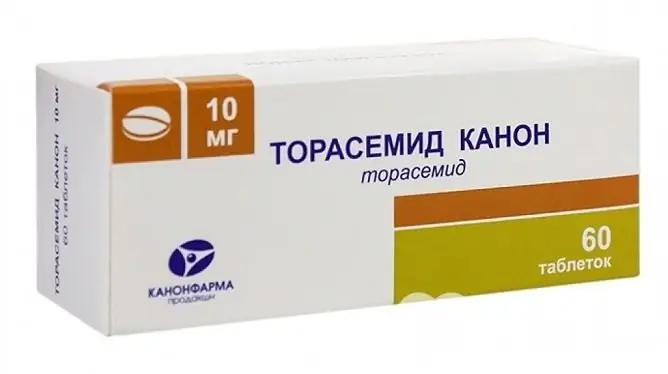
Torasemide is a loop diuretic used in the treatment of hypertension
In some cases, potassium-sparing diuretics, for example, Spironolactone, may be included in the complex therapy of arterial hypertension.
Diuretics should only be taken as directed and under medical supervision. Their long-term use is often accompanied by the development of a number of side effects:
- disorders of uric acid metabolism;
- violations of water and electrolyte balance;
- dizziness;
- severe general weakness;
- disturbances in the picture of peripheral blood;
- decreased sex drive;
- negative impact on metabolic processes in the body.
Contraindications to the appointment of diuretics are:
- hypersensitivity to sulfonamides;
- gout;
- pregnancy and lactation.
Sartans
Sartans (angiotensin II receptor antagonists, ARA) are modern antihypertensive drugs. These include drugs such as Telmisartan, Valsartan, Losartan (Lorista), Eprosartan.
Sartans can be used to treat arterial hypertension even in the category of patients who are prohibited from ACE inhibitors, for example, after stenting of the coronary vessels.
The use of sartans is possible only under the supervision of a physician, since complications (skin rashes, dry cough, Quincke's edema, hyperkalemia) may develop during therapy. These drugs are contraindicated in pregnancy and lactation, in pediatric practice, as well as in patients with renal artery stenosis.
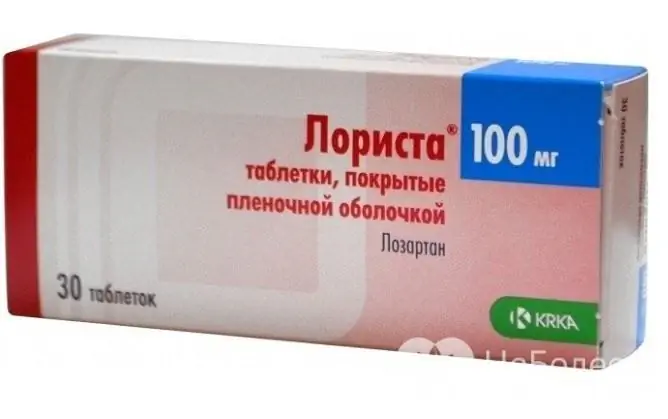
Lorista is a drug of the sartan group, or angiotensin II receptor antagonists
Other drugs
Some other drugs, in particular myotropic antispasmodics (Papaverin, Dibazol, No-shpa), also allow you to quickly reduce pressure with tablets. However, they are effective only with a slight increase in blood pressure in patients with the initial manifestations of hypertension. Starting from stage II, one should not expect a hypotensive effect from myotropic antispasmodics.
Against the background of angina pectoris, you can quickly reduce the pressure with Nitroglycerin. This drug not only relieves spasm of the coronary arteries, but also has a pronounced vasodilating effect, which is manifested by a decrease in blood pressure.
Video
We offer for viewing a video on the topic of the article.

Elena Minkina Doctor anesthesiologist-resuscitator About the author
Education: graduated from the Tashkent State Medical Institute, specializing in general medicine in 1991. Repeatedly passed refresher courses.
Work experience: anesthesiologist-resuscitator of the city maternity complex, resuscitator of the hemodialysis department.
Found a mistake in the text? Select it and press Ctrl + Enter.
